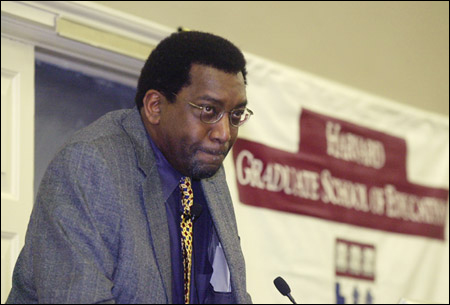Educator takes tough look at conservatives progressives
Payne: ‘A Curse on Both Your Houses’

“I do not believe we know how to change urban schools at scale,” said Payne, acknowledging that there have been individual successes, but educators and policy-makers have not yet learned how to effect change broadly. “We’re so committed to our paradigms that we only use the information which fits, and that’s an awfully slow way to learn.”
Payne, the Robinson Professor of History, African American Studies and Sociology at Duke and author of several books on urban education and the Civil Rights Movement, delivered on his promise to make everyone – progressives and conservatives alike – uncomfortable with his talk, which was co-sponsored by the GSE and the Department of African and African American Studies.
Conservatives, he said, are generally characterized by their belief in imposing incentives and accountability as a means toward school reform. “And we ain’t gonna pay for it,” he added, noting conservatives’ reluctance to put resources behind their reforms.
Progressive viewpoints, which he said dominate most American schools of education, find conservative theory to be morally and substantively deficient; liberals promote a bottom-up process toward improvement, he said.
The problems with progressives
Payne took issue with progressives’ resistance to criticizing or challenging the poor. “We do not talk much, therefore, about poor children or poor parents as part of the solution,” he said. Yet small changes in parent behavior have yielded major changes in some urban schools, he said, citing success in schools in Chicago, New York, Sacramento, and right here in Boston.
“We do not have to have dramatic changes in parent behavior to get dramatic changes in schools,” said Payne. Parents “are resources that are going unused. It’s quite possible that this is a lever for change that’s easier to push than other levers for change.”
Further, he said, not acknowledging that parental behavior in the inner city is sometimes problematic negates teachers, who confront parental behavior and its challenges on a daily basis. And teacher skepticism and resistance is a serious barrier to the voluntary, bottom-up school change that progressives promote.
Money matters
“Sometimes,” Payne said, “I’m near despair at the intellectual shabbiness” of progressives and their rigidity of dogma and selective use of evidence.
“And then I look at the other side of the aisle,” he continued. Conservatives are guilty of maintaining a reductionist sense of human motivations, of child development, of educational research. But conservatives’ greatest sin, said Payne, is “their staunch cheerful refusal to even think about issues of resource allocation.”
Grappling with questions like “Does money matter?” or “Does class size matter?” said Payne, demonstrates the hollowness of the discourse. No one asks these questions in wealthier, whiter districts, he said, for the answers are obvious: of course they matter, and why shouldn’t they matter in poor, urban, minority schools?
“If we begin with the notion that they’re like everybody else’s kids, then the same thing money does for everybody else’s kids it can do for them,” he said. “I’m suspicious whenever someone says, ‘poor people don’t need what I’ve got.’”
Resources – at a moderate level, at least – are necessary to make high-stakes testing, the keystone of conservatives’ school reform movement, effective. With moderate resources, said Payne, we can expect test scores to rise for several years before reaching a plateau, and we can see dramatic improvement in the lowest-scoring schools.
Still, with anxiety rising over current conservative leadership and its No Child Left Behind Act, progressives and academics like those at the GSE may have a unique opportunity, said Payne. To take advantage of it, however, they must lead the discussion with more modesty and less rigidity than they have demonstrated.
Payne closed his talk by charging the audience with very clear responsibilities. “I’m holding all of you accountable,” he said.




